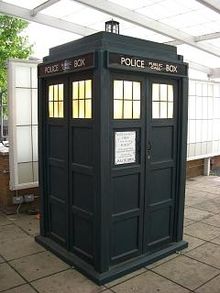If Dr. Bunny Loaned You His Tardis
 Who Eli? Well yes, he has such a device, but really what this is about is a contest that Science Magazine ran for young scientists
Who Eli? Well yes, he has such a device, but really what this is about is a contest that Science Magazine ran for young scientists
If you could go back in time and share one piece of scientific knowledge from today, what time period whould you choose, what would you share and how might that information change the course of history?There were some dumb winners, for example telling Edison how to build solar cells, wouldn't work because you would have to develop the infrastructure, talking about microbiology on the molecular scale in 600 BC, that would go in one ear and out the other, talking to Newton about relativistic mechanics, in whose time the speed of light was even an issue, encouraging the Emperor of China that women are the equals of men, right, just about the same as telling Nathan
For Eli, the two best answers were from Jungal Shah who wanted to give the fundamental theorem of calculus to Archimedes in 222 BCE, and Zeshaan Maan, who would convey the benefit of hand washing to physicians, to Su Song of China in 1070. Samuel Rutledge also spotted this as important, but he wanted to talk to Semmelweis, not about hand washing, but about the importance of embracing unconventional work.
Think about it while Eli gets the Tardis detailed.





13 comments:
My vote would have been to tell Archimedes to get out of the street when the Romans invaded
> share one piece of scientific knowledge from today
Rules of the game, anonymous :-)
I am reminded of a historical SF novel by Lyon Sprague de Camp, "Lest Darkness Fall". Indeed the knowledge for building a printing press would be the obvious thing to transfer to the Romans... but it's hardly a single piece of scientific knowledge. And then you need paper making...
I wish I knew what one "piece" of scientific knowledge meant.
I don't know if it counts, but I'd try to teach the advantage of scientific publishing. That you get credit for publishing work, not for keeping it secret doling out little pieces at a time. So much science has been delayed or lost because early scientists often didn't share.
From one found manuscript we know that Archimedes knew at least basic calculus , but we don't know how much or what theory he used and at some point the knowledge was lost.
For me:
I would let Archimedes know that pretty much anything with wings will fly, and lift weight, if the wings are large enough. I think it would have been entirely feasible to build a glider in the third century BC.
I'd rather go forward in time to bring back an uncontroversial value of CO2 doubling sensitivity from the year of its discovery.
If there is one.
A common theme in the universe of Vernor Vinge's {A Fire Upon The Deep, A Deepness in the Sky, and Children of the Sky (and presumably the missing book after ADitS) is:
a) Somebody with strong science and technology, all well-recorded, but lacking a civilization of that level, needs to:
b) Accelerate some civilization from its current level far enough to satisfy the needs of a), in part by selecting short critical paths to minimize overall time to achieve all of the needed tech.
The issue is as Eli notes, that science and technology development paths are quite entangled, and new technology often needs a bunch of predecessors. Sometimes people can build things without having much theory, sometimes that is hard.
So, for one bit of science to have a big short-term effect, it would have to be knowledge implementable within the tech of the time.
Hence, the hand-washing idea is not bad. Another might be to explain the causes and possible prevention/lessening methods for the Black Death, back in 6th century to lessen the Plague of Justiniian.
http://en.wikipedia.org/wiki/Black_Death
Just a little tidbit. It's Nathan Bedford Forrest, not 'Nathaniel.'
One of those things from having grown up in his home state.
Like Russell, I would also rather go forward in time, but to see when mankind will grow up into not inventing fake controversies.
If ever.
* The germ theory of disease. (Whether you can see the germs or not, it lets you make successful predictions, such as handwashing.)
* The balloon (technologically, anyone from the ancient Egyptians forward could have built a hot air balloon).
* Give classical Greeks (thence Romans, start with, say, Pythagoras to ensure they're common knowledge by Archimedes' time) Hindu-Arabic numerals (including, especially, zero).
* Take Huygens' pendulum clock escapement back to, well, anywhen. Once time can be measured accurately, the ellipticity of the earth's orbit around the sun is obvious. Pendulum clock, once it was invented, spread so fast across the world that people who study medieval technology cannot tell where it was invented first. The technology isn't difficult (certainly not for the people who invented the Antikythera device!).
Given the number of times calculus has been rediscovered or nearly so, the bigger problem seems to be avoiding the intentional destruction of knowledge rather than knowledge transfer.
Taylor B
What Taylor said. The Antikythera Device is supposed to have instructions inscribed on it. Nobody does that for one-off prototypes, and the metalworking technology in it wouldn't be seen again until, what, The Enlightenment?
It's what's been lost that we don't even know the existence of that spooks me.
Post a Comment